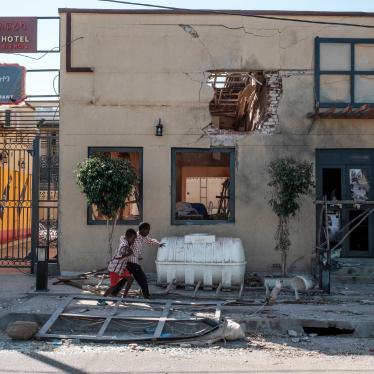Human Rights Watch appreciates Ireland’s efforts to maintain momentum on a political declaration on the use of explosive weapons in populated areas. The latest draft is a good basis for further discussions, but it should be improved in several ways. Today I will highlight our recommendations for strengthening the title and Section 1, many of which are also relevant to other parts of the declaration.
First, the declaration should not downplay the humanitarian consequences of the use of explosive weapons in populated areas. The text frequently refers to civilian harm as something that “can” occur. Given that this harm is well documented, the qualifier “can” should be deleted in the title, Section 1, and elsewhere; at a minimum, the declaration should replace phrases like “can cause” with “has caused” to emphasize that harm has actually occurred and is not merely a potential future impact.
Second, Section 1 should comprehensively describe the consequences of the use of explosive weapons in populated areas. While we welcome the more detailed explanation of reverberating effects, we recommend breaking the impacts of explosive weapons into three categories: direct effects, which are proximate in time and space to the attack; indirect effects, which derive from direct effects but are one or more steps removed; and reverberating effects, longer-term and broader effects that include the disruption of essential services and displacement. Whatever categories are used, the preamble should clearly present and distinguish among all types of harm.
Third, Section 1 should sharpen its description of specific impacts. For example, the reference to damage to hospitals should be reinstated in paragraph 1.2. To preserve the focus of the declaration, Paragraph 1.3 should address the psychological and psychosocial harm caused by the use of explosive weapons in populated areas, rather than urban warfare more broadly. Paragraph 1.4 should note that explosive remnants of war, rather than unexploded ordnance, cause casualties during as well as after hostilities have ended. The addition of a sentence on the environment is a positive development.
Fourth, the title and Section 1 should more precisely present the scope and purpose of the declaration. The phrase “with wide area effects” was inappropriately inserted in several places in this draft. It should be removed from the title and paragraph 1.1 because parts of the declaration address the use of all explosive weapons in populated areas. Similarly, it should be removed from paragraph 1.7 because data should be gathered and shared on the use of all explosive weapons in order to understand fully the problem the declaration seeks to address.
The use of “wide area effects” is appropriate in certain places, such as in the commitment in paragraph 3.3. Therefore, Section 1 should explain that the term encompasses weapons that have a broad blast and fragmentation radius, are inaccurate, or launch multiple munitions at once, or have a combination of those factors.
For a more detailed discussion of our recommendations, please see our recently released commentary on the whole draft declaration.







